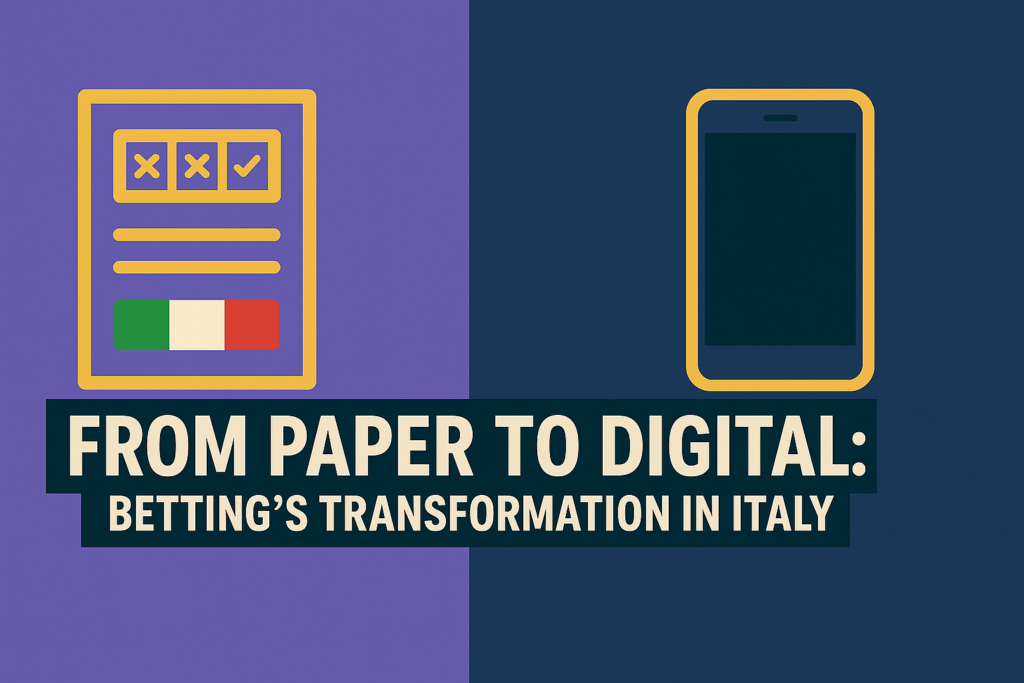Italy has a deep-rooted history with games of chance and sports wagering – starting from paper betting slips to today’s sophisticated digital platforms. Over the past twenty years, the sector has been completely reshaped by modernization, regulation, and global competition.
This piece traces the transformation of Italy’s betting industry, from the SISAL-led monopoly era to a diverse ecosystem of licensed online operators. It also explains why this transition holds significance not only for the economy, but also for consumer protection, marketing strategies, and maintaining a consistent regulatory framework in one of Europe’s most advanced gambling markets.
Although gambling in Italy has been regulated for decades, the rise of the internet forced a complete overhaul of its structure. SISAL, founded in 1945 in Milan, introduced Italy’s first official sports betting system, becoming a symbol of post-war renewal.

Between 2000 and 2010, legislation started paving the way for officially licensed remote gaming operators. A major breakthrough came with Legislative Decree 41/2024, which restructured the country’s gaming laws and established updated standards for remote betting, player safety, and responsible gambling.
| Period | Regulatory milestone | Significance |
|---|---|---|
| Pre-2000s | Regulation of fixed-odds betting (e.g. Decree 174/1998) | Established the legal foundation for betting outside traditional retail channels. |
| 2006–2010 | Liberalization of online betting (AAMS/ADM licenses) | Opened Italy’s market to international operators under local concessions. |
| 2024–2025 | New reform (Legislative Decree 41/2024) | Reorganized licensing, player protection measures, and technical requirements. |
Comment: This table illustrates Italy’s progression from a single-operator monopoly to a structured, regulated digital betting environment.
Italy’s online betting sector has recently experienced major overhauls – spanning licensing fees, taxation, and responsible gaming obligations.
The Customs and Monopolies Agency (ADM) has recently approved 46 new remote gambling concessions, signalling the beginning of a fresh licensing phase. The updated tax system applies a 24.5% gross gaming revenue (GGR) tax on remote sports betting and 25.5% on casino and poker games.
| Indicator | Latest figure | Note |
|---|---|---|
| Estimated online GGR in Italy (2024) | ≈ €5 billion | Online activities account for about 25% of the total gaming market. |
| Remote licenses available | ~50 licenses, valid for 9 years, €7 million fee each | Part of the 2025 reform package. |
Comment: This data shows how digital betting now forms a significant share of Italy’s regulated market, managed under stricter and more transparent concession rules.
Traditional operators are now adopting an omnichannel model, merging retail shops with online platforms to remain competitive. SISAL continues to be a pillar of Italy’s gaming industry, while international brands such as bet365 and William Hill thrive in the regulated digital environment. These major players shape Italy’s betting landscape, where reliability, localization, and mobile technology are defining factors.
The digital transition has made betting more accessible – with mobile wagering, live odds, and interactive experiences becoming standard. However, it has also raised new concerns around player safety, addiction, and transaction security. Italy’s updated framework addresses these issues through mandatory deposit limits, self-exclusion systems, and dedicated monitoring for players aged 18–24.
Licensed operators now face significant entry costs, strict compliance demands, and extensive auditing obligations. This environment has prompted market consolidation, where only financially strong groups can sustain operations.
Advertising limitations – particularly the national ban on gambling promotions – have led brands such as Eurobet and Goldbet to rely on indirect strategies, including educational content, responsible gaming initiatives, and legal partnerships. Despite these constraints, competition remains fierce, especially when it comes to offering appealing promotions and user experiences within regulatory boundaries.
A prime example of adaptation is SISAL – once Italy’s retail betting icon, now a leader in digital operations. Its 2021 acquisition by Flutter Entertainment for €1.9 billion demonstrates Italy’s significance in the global gaming landscape.
Meanwhile, digital-native operators like AdmiralBet bring cutting-edge technology and seamless user interfaces, while established local brands such as SNAI combine their strong retail base with regionally tailored customer service. This blend of tradition and innovation defines the competitive spirit of Italy’s betting market.
Across Europe, Italy’s regulatory stance aligns with markets like France, where the Autorité Nationale des Jeux (ANJ) implements comparable measures for player protection and industry integrity.
The evolution of Italy’s betting market reflects a broader movement toward modernization – from state-run monopolies to a dynamic, tech-focused ecosystem. Established leaders like SISAL paved the way, local operators such as Lottomatica and Marathonbet have contributed to domestic growth, and global players like bet365 have accelerated the digital transition.
Looking forward, the integration of online and retail systems, stronger consumer protection policies, and a balanced regulatory approach will shape the next decade. Operators that can successfully merge innovation, compliance, and omnichannel strategy are expected to lead Italy’s future betting landscape.
The ADM’s reforms and the 2025–2026 licensing cycle will not only define Italy’s next phase but may also serve as a model for how other European markets pursue sustainable and responsible gaming regulation.